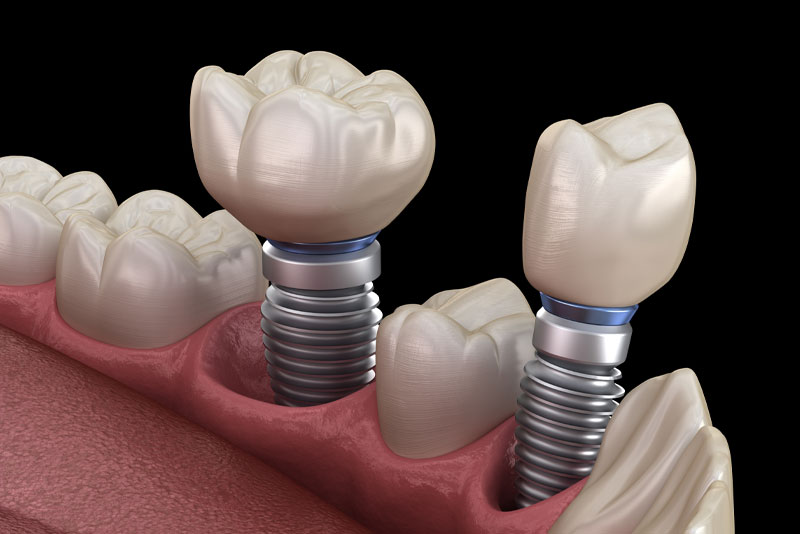Dental implants have revolutionized restorative dentistry, offering a long-lasting and highly effective solution for individuals with missing or damaged teeth. These implants not only restore the function of natural teeth but also enhance aesthetics and improve overall oral health. A complete dental implant consists of three essential components: the implant screw, the abutment, and the crown. Each part plays a crucial role, with the abutment serving as a vital link between the implant and the final restoration.
An abutment on implant is the connector piece that secures the artificial tooth to the titanium implant embedded in the jawbone. Once osseointegration—where the implant fuses with the jawbone—is complete, a dental professional carefully places the abutment to create a stable foundation for the crown. This small yet essential component ensures the success and durability of the implant by providing structural integrity and alignment for the final restoration.
The abutment’s function is critical to the longevity of the dental implant. It must be precisely positioned to ensure stability, comfort, and a natural appearance. Without a properly placed abutment, the final restoration may feel loose, uncomfortable, or even lead to implant failure. By understanding the significance of the abutment in the implant process, patients can make informed decisions about their dental health and treatment options.
Types of Abutments and Their Unique Advantages
Abutments come in different designs to accommodate various clinical and aesthetic needs. Custom abutments are specifically tailored for each patient, ensuring a precise fit and a natural look, making them ideal for front teeth restorations. These abutments are meticulously crafted to align perfectly with the gum line, offering superior aesthetic results. In contrast, stock abutments are pre-fabricated in various standard shapes and sizes, providing a cost-effective option for cases where exact customization is not essential.
Materials also play a significant role in abutment selection. Titanium abutments are widely used due to their exceptional strength, biocompatibility, and durability. They integrate seamlessly with the jawbone and are resistant to corrosion, making them a long-term solution for most patients. On the other hand, zirconia abutments are highly favored in aesthetic zones due to their tooth-colored appearance, blending naturally with surrounding teeth while still maintaining sufficient strength.
Selecting the right type of abutment depends on factors such as implant location, gum tissue condition, and aesthetic goals. A highly visible tooth replacement may benefit from a zirconia abutment, whereas a molar replacement requiring enhanced durability may be best suited for a titanium abutment. Consulting with an experienced dental professional ensures the appropriate abutment choice for optimal functionality and appearance.
Factors Influencing Abutment Success in Dental Implants
Several critical factors contribute to the success of an abutment on implant, including the quality of the jawbone, surgical precision, and post-operative care. Bone density and volume play a crucial role in ensuring the stability of the implant. A strong and healthy jawbone provides a solid foundation for implant integration, reducing the risk of complications. In cases where bone quality is insufficient, bone grafting may be required to enhance implant success.
Surgical expertise is another vital factor in achieving long-lasting dental implants. A skilled dental professional must accurately place both the implant and abutment to ensure proper alignment, function, and comfort. The angle and depth of implant placement directly impact the abutment’s positioning, highlighting the importance of precision in implant dentistry. Utilizing advanced imaging technology and guided surgery techniques enhances accuracy and outcomes.
Post-operative care significantly influences the longevity of the implant. Proper oral hygiene practices, such as brushing, flossing, and regular dental visits, help maintain the health of the surrounding gum tissue and prevent infections. Patients should follow their dentist’s recommendations for abutment care, including avoiding excessive pressure on the implant site during healing. A commitment to long-term maintenance supports implant success and extends the lifespan of the restoration.
Partnering with the Right Dental Professional for Your Implant Journey
Choosing the right dental provider is essential for achieving the best outcomes with dental implants. An experienced implant specialist understands the nuances of abutment selection, surgical placement, and aesthetic considerations. With expertise in implantology, a knowledgeable dental professional can customize treatment plans to meet each patient’s unique needs and expectations.
Comprehensive implant planning ensures seamless integration of the abutment with the implant and crown, optimizing both function and aesthetics. A reputable dental practice utilizes cutting-edge technology, high-quality materials, and meticulous techniques to deliver outstanding results. Patients should seek a provider who prioritizes precision, patient education, and personalized care throughout the implant process.
At Smile Makers Dental Care, we are committed to providing exceptional dental implant solutions tailored to each patient. Our skilled team carefully selects and places abutments to ensure optimal implant performance, comfort, and longevity. With a focus on advanced techniques and patient-centered care, we help individuals achieve lasting dental health and confident smiles.
Are you ready to restore your smile with dental implants at our skilled and trusted dental practice? Don’t wait to get the smile of your dreams with us. Get in contact with our doctor, Dr. Gavin Ewing and our exceptional team at our practice to schedule an appointment today!




